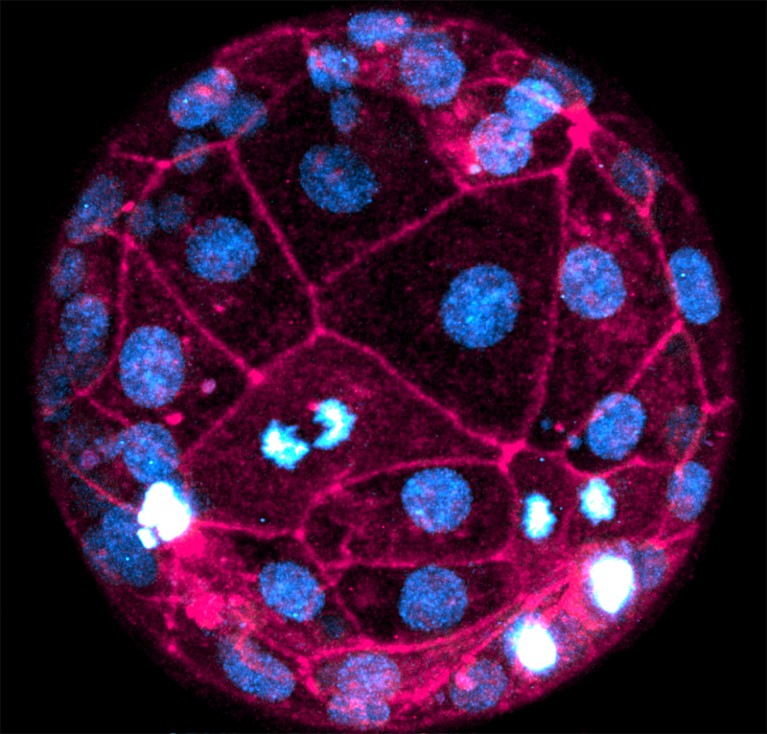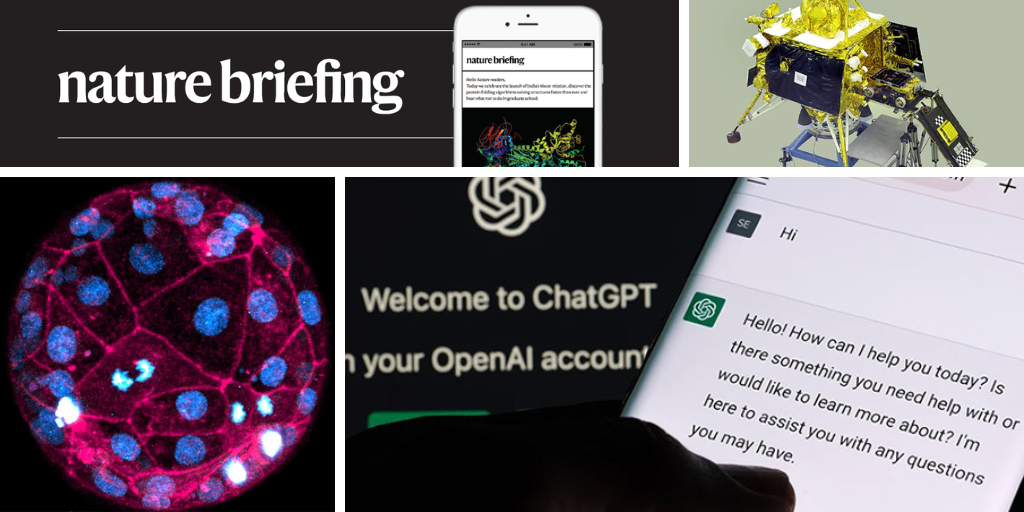Hello Nature readers, would you like to get this Briefing in your inbox free every day? Sign up here.

A live human embryo imaged using the fluorescent dyes SPY650-DNA (blue) and SPY555-actin (pink).Credit: Robin M. Skory, Ana Domingo-Muelas
The first days of human embryo development have been revealed with a clarity never seen before. The imaging technique uses two common laboratory tools: fluorescent dyes and laser scanning microscopes. “We can see single cells and how they interact with each other as they form the pre-implantation embryo,” explains cell biologist Nicolas Plachta, a member of the team, which imaged dozens of live embryos during the first 40 hours of development. This type of non-invasive imaging could one day allow for screening of embryos conceived through in vitro fertilization.
A pair of scientists has produced a research paper in less than an hour with the help of ChatGPT — a tool driven by artificial intelligence (AI) that can understand and generate human-like text. The goal was to explore the chatbot’s capabilities as a research ‘co-pilot’ during the entire process, from crunching raw data to writing a polished manuscript. The article was fluent, insightful and presented in the expected structure for a scientific paper, but researchers say that there are many downsides. For example, such tools could make it easier for researchers to engage in dishonest practices such as P-hacking, for which scientists test several hypotheses on a data set but report only those that produce a statistically significant result.
Reference: ChatGPT paper (pdf)
On July 14, India will launch Chandrayaan-3: its second attempt to land a spacecraft and rover on the surface of the Moon. In 2019, the Chandrayaan-2 mission crash-landed in the final moments of its touchdown. If successful, India will become the fourth country ever to make a controlled lunar landing, after the United States, the former Soviet Union and China. Chandrayaan-3 will focus on the lunar south pole, a previously unexplored region, with a range of planned measurements and analyses. Even if it does not have a dramatic impact on scientific knowledge, a successful mission will have “important technological and geopolitical dimensions”, says space-policy analyst Tomas Hrozensky.
Features & opinion
When patients no longer respond to any antibiotics, phages — bacteria-killing viruses — can sometimes save lives. Microbiologist Jessica Sacher is helping to make this happen. As a co-founder of Phage Directory, she connects physicians looking for phages with those who can produce them at a safe-to-use quality. The directory “post calls or ‘alerts’ for phages against different bacterial strains”, Sacher explains. “We receive one such request a week on average, and 84% of the alerts we have sent out have received a response, such as sharing of phages or directing requestors to labs with the appropriate phage.”
“I hope [this story] resonates with people who love deeply from afar and often feel lonely for it,” says author Ayida Shonibar of the latest short story for Nature’s Futures series.
Andrew Robinson’s pick of the top five science books to read this week includes an intriguing investigation of Earth-like exoplanets and a tantalizing analysis of invisibility.
Even a bacterium that has just enough genes to survive can evolve. Scientists initially thought that any mutations would kill cells with such a minimal genome because they lack the genes to repair damaging DNA changes — but, in the words of Jurassic Park’s fictional scientist Ian Malcolm, “life finds a way”. Over 2,000 generations, the ‘minimal’ bacteria strain recovers some of the fitness cost associated with having a stripped-down genome. “In some cases, this minimal cell actually evolved faster than the non-minimal cell,” biologist Jay Lennon tells the Nature Podcast. He explains that this could have implications for synthetic biology: “The forces of evolution simply can’t be avoided.”
Nature Podcast | 29 min listen
Subscribe to the Nature Podcast on Apple Podcasts, Google Podcasts or Spotify.






More News
Daily briefing: Why exercise is good for us
Daily briefing: Orangutan is first wild animal seen using medicinal plant
Old electric-vehicle batteries can find new purpose — on the grid